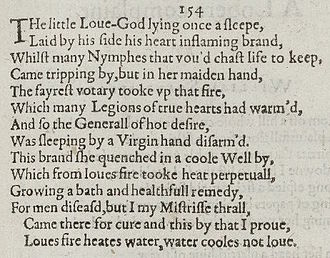| Sonnet 154 | |||||||
|---|---|---|---|---|---|---|---|
 Sonnet 154 in the 1609 Quarto | |||||||
| |||||||
As the last in the famed collection of sonnets written by English poet and playwright William Shakespeare from 1592 to 1598, Sonnet 154 is most often thought of in a pair with the previous sonnet, number 153. As A. L. Rowse states in Shakespeare's Sonnets: The Problems Solved, Sonnets 153 and 154 "are not unsuitably placed as a kind of coda to the Dark Lady Sonnets, to which they relate."[2] Rowse calls attention to the fact that Sonnets 153 and 154 "serve quite well to round off the affair Shakespeare had with Emilia, the woman characterized as the Dark Lady, and the section of the Dark Lady sonnets".[3] Shakespeare used Greek mythology to address love and despair in relationships. The material in Sonnets 153 and 154 has been shown to relate to the six-line epigram ascribed to Marianus Scholasticus in the Greek Anthology.[4] The epigram resembles Sonnets 153 and 154, addressing love and the story of Cupid, the torch, and the Nymph's attempt to extinguish the torch.[5]
- ^ Pooler, C[harles] Knox, ed. (1918). The Works of Shakespeare: Sonnets. The Arden Shakespeare [1st series]. London: Methuen & Company. OCLC 4770201.
- ^ [Rowse, A. L. Shakespeare's Sonnets: The Problems Solved. Harper & Row, Publishers. New York: 1964. pg. 317]
- ^ [Rowse p.319]
- ^ Anth. Pal. ix. 627.
- ^ [Schoenfeldt, Michael Carl. "FINIS." A Companion to Shakespeare's Sonnets. Oxford: Wiley-Blackwell, 2010. 68. Print.]